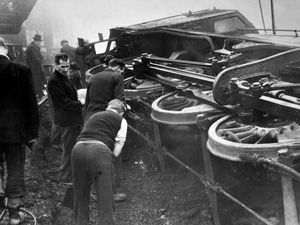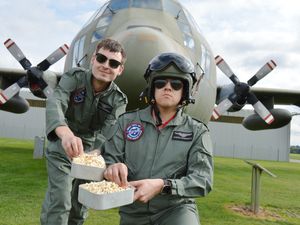The Olympics, its Shropshire origins and how one marathon runner gave up and went for a beer
I emitted a whoop and fist-pumped the air in triumph as our own Tom Daley and Noah Williams entered Olympic water simultaneously, arrow straight, arrow accurate.
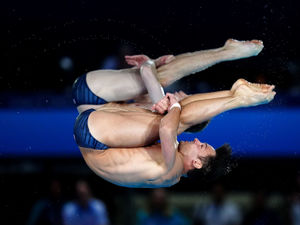
From my armchair, I saluted the TV screen with an opened beer can and near blubbed with the pair as silver medals were draped round their necks.
Yet the emotion was stirred by a sport, synchronised 10m diving, of which I have no comprehension. Ditto, synchronised 8m diving, if such a discipline exists.
What separates a good dive from an awful dive? I once jumped, knees grasped to my chest, from the high board at Bushbury Baths.
That was an awful dive. I know that because of the tsunami unleashed and number of families who frantically sought safety on the sidelines.
I also surfaced with stuff coming out of my nose. Tom, Noah and fellow competitors never did that.
My living room echoed to cries of support as Britain jumped, galloped and dance to gold in “Eventing”, an equestrian triathlon that appears to have bypassed much of the West Midlands, although our friends in Shropshire will no doubt know more. During the dressage section, my wife asked: “Clever horses or just really hot sand?”
My beer can was hurled on the floor in disgust when Wolverhampton boxer Delicious Orie lost his super-heavyweight bout.
That, like football, is a sport I know about. Colour commentators and their baffling technical terms - “a superb triple fandango from Amanda”, “there was a wobble on the half-flange” – are not required.
Such is the near hypnotic allure of the Paris Olympics, from surreal opening ceremony to sports that have, until now, remained something of a secret to the majority.
But then, the Games have always included pursuits not embraced by working men and women. In their infancy, the Modern Olympics played host to the downright bizarre and silly.
Mark Oliver, author of on-line talking point 'All Things Interesting', explains: "In the first few years, the International Olympic Committee still hadn’t settled on the major events that would define the games. They tried a lot of different things before they landed on the events we know today – and, in the meantime, there were a lot of incredibly weird Olympic sports.”
If they returned, Britain’s medal haul would be far greater. Men from our region would do this country proud should pigeon racing, included in the programme of competitions for Paris 1900, make a comeback.
Admittedly, it wouldn’t make for great TV.
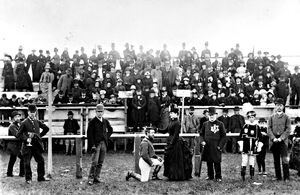
The very first Olympic Games staged in the Shropshire town of Much Wenlock, an 1850 gathering that laid the foundations for today’s global extravaganza, wowed crowds with blindfold wheelbarrow races.
Bring them back.
Audiences are in awe of the speed, stamina and athleticism of cyclists. Let them try pedalling a Penny Farthing, as the Much Wenlock medal hopefuls did. That should weed out the drug cheats.
And the Games have always been stained by skullduggery, by those intent on fracturing rules in the quest for fame, either through taking banned substances or simply cheating.
Thomas Hicks, born in the West Midlands, but representing America, would today have been stripped of his 1904 marathon gold medal.
In the suffocating 90 degrees heat of a summer’s day in St Louis, Missouri, Hicks, choking on dust thrown up by charabancs, quit after 19 miles.
At the roadside, he was given a potent mixture of eggs, brandy and strychnine which worked wonders, for a while.
Hicks was then given a second dose of the potentially lethal cocktail and, not surprisingly, collapsed seconds after claiming victory.
The unsporting side of my nature has a sneaking regard for Fred Lorz, originally declared winner of the race until it was discovered he’d hitched a lift after nine miles.
In fairness, Lorz ran the last five. That is surely a lesson for modern distance runners. Want to beat the Kenyans? Book an Uber beforehand.
Documents show that 1904 marathon descended into madness. Cuban hope Felix Carvajal de Soto delayed the start by insisting on competing in long trousers and street shoes.
He constantly stopped and chatted to spectators, then took a detour to scrump apples. The sour fruit later forced de Soto to seek medical attention for stomach cramps, yet he still finished fourth.
Felix’s performance adds weight to the argument early Olympians were, unlike today’s marathon men, less willing to push their bodies to the limits of endurance.
Fag breaks along the way were not unknown.
Georges Touquet-Daunis was favourite to take gold at the 1900 Paris marathon.
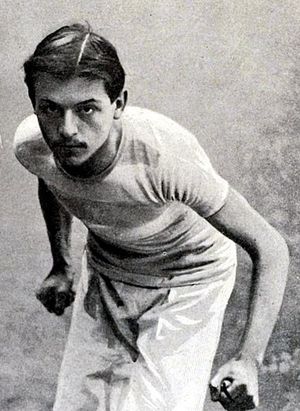
But with the thermometer nudging 100 degrees, Georges decided things were getting a little silly. He stopped at a café for a few beers and by the time the Frenchman re-emerged into the blazing sunshine, the race was over.
Shizo Kanaguri went spectacularly AWOL during the 1912 Stockholm marathon. Close to exhaustion, the Japanese athlete staggered into a residential garden where the householders, brim-full of Swedish hospitality, presented him with a hearty meal…then tucked him up in bed.
Shizo didn’t wake until the next day. Had he completed the course, he would’ve clocked the slowest time in history, a record destined never to be broken. Shizo avoided that ignominy by immediately return home in disgrace.
Swimming, too, has taken time to find its present form and encountered troubled waters along the way.
The first international Games, staged in Athens in 1896, tasked 1500m swimmers to brave the Bay of Zea’s freezing temperature and 12 foot waves.
There were no tears of joy from 15-year-old winner Alfred Hajos who, gulping for air, admitted: “The will to live overcame any desire to win. I was scared for my life.”
Fans who gathered to witness underwater swimming in 1900 left downbeat and deflated. They and organisers soon realised the new competition had one fundamental flaw. You couldn’t see those taking part.
Games have come along way since snoozing Shiro and struggling Alfred. No early Olympics underlines the giant strides taken like Paris 1900 which included truly bizarre 'sports'.
Official site Olympics.com sums-up the haphazard nature of the tournament: “The organisers spread the competition over five months and under-promoted their Olympic status to such an extent that many athletes never knew they had actually participated in the Olympic Games.”
Margaret Abbott certainly didn’t. On holiday with her mother, the American decided to sign-up for a fun golf tournament and only realised she was a gold medallist after returning home.
Paris spawned a mystery that has never been solved. Olympics.com adds: “The Dutch coxed pair suddenly needed a replacement coxswain. A French boy, aged seven to 12, was chosen and the Dutch pair rowed to close victory.
“The French boy joined in the victory celebration and had his photograph taken. Then he disappeared. Years of research has failed to turn up a clue as to his name or actual age.”
Paris 1900 represents the only time animals were deliberately killed in the pursuit of medals and an official document about those games described live pigeon shooting as “tres aristocratique” – very aristocratic.
It wasn’t, which is why the spectacle was never repeated.
Website topendsports explained the event’s rules: “Six birds were released 27 meters in front of the participant. The participant was eliminated once they missed two birds. The winner was the competitor who shot down the most birds from the sky. Nearly 300 birds were killed.”
The plug wasn’t pulled on live pigeon shooting following an outcry over animal cruelty. It was seen as too messy, with the stadium left blood splattered and carpeted in feathers.
Organisers learnt from their mistakes. Thankfully, “running deer shooting”, held at London 1908, entailed firing at wooden models.
Paris 1900 pushed the envelope with a raft of new categories, many never to be repeated, many decidedly off-the-wall. It has rightly been dubbed The Farcical Games by historians.
Pierre de Coubertin, co-founder of the Olympic movement, insisted on an arts competition. The literature section was won by Pierre de Coubertin, co-founder of the Olympic movement.
Though now referred to as “unofficial events”, medals were won for kite flying, ballooning, fire fighting and cannon shooting.
The worth of a such curious contests to our small island is illustrated by the fact we did very well, coming third in the medal table and collecting 15 golds.
We need them back -and why not throw in sheep dog trials?
A mammoth field of 300 hopefuls took part in the angling tournament, a sport that we would surely excel at today, although BBC presenter Clare Balding may struggle to inject excitement into the action and growing drama.
In more conventional categories, Birmingham’s Moseley Wanderers struck silver for rugby.
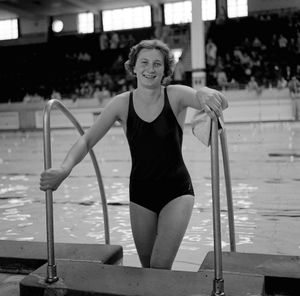
The Olympics have created many heroes. Our region has its share: West Brom’s Denise Lewis, winner of the heptathlon in 2000; 1960 swimming sensation Anita Lonsbrough, from Wolverhampton; 2000 track cyclist Jason Queally from Great Haywood, Staffordshire…
As a keen ornithologist, there is none, in my eyes, greater than rowing legend Bobby Pearce. The Australia was crowned single skulls champ in 1928, despite stopping his boat to let a family of ducks pass.
Bobby was a man who detested fowl play.
There have been many villains, but none more brazen and entertaining than Barry Larkin, bogus torch-bearer at the Sydney 1956 opening ceremony.
Oblivious to the deception, crowds cheered as Barry ran into the arena holding aloft a counterfeit torch made from a chair-leg and paraffin-soaked underpants.
They applauded loudly as Barry handed the flame to mayor Pat Hills.
While the civic leader was delivering his stirring speech, an aid whispered: “Sir, you’re holding a pair of burning underpants in the air.”
Today, a time of avant-garde, near acid trip opening ceremonies, that embarrassment would be considered an artistic triumph.


